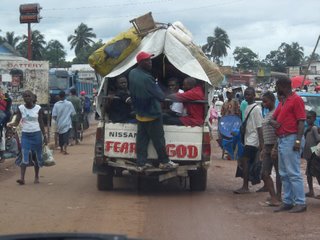
Mary Tom and I made it to Africa! And it’s been quite an adventure already. I already feel like I’ve been here forever, even though things are still so new. We spent a day in Monrovia, and then headed out to Cuttington, 120 miles away. We are all still figuring out just what we will be doing here. I’ve been spending time touring the school farm, and am spending this week shadowing the supervisor in each of the different areas. They have a rubber plantation, pigs, chickens, a fish pond in development, vegetables, and rice paddies. I met with the Dean of the College of Agriculture and Rural Development yesterday. It was surreal to look over course schedules and descriptions in his office, where the power was out, and where the walls were still stained from the damage sustained during the war. He said my arrival was timely and he hoped my presence would encourage women to join the
College of Agriculture, which is currently dominated by men. I have a month to work on the farm before classes start. I still don’t know what I will be doing except that I will be working with the students, and with the management team on the farm. The farm management team has welcomed me very warmly. Cuttington’s campus is 1,500 acres, and could be considered the most prestigious college in Liberia. Charles Taylor (the notorious war lord) and his troops occupied the campus for part of the war. They destroyed all the infrastructure, consumed all of the agricultural products and animals, burned all the documents and books, and destroyed the buildings by tearing off the roofs. Not to mention the torture, maiming, and murder they committed all over the country, ultimately resulting in the deaths of 250,000 people. The UN is still a very big presence here, and there are signs of a recent terrible conflict everywhere. Power is returning to parts of the capitol city for the first time in 15 years. Grant funding has provided for basic rebuilding of many campus structures at Cuttington, though running water is still hope for the future. I was surprised to see almost no guns in the streets, even the national police are not allowed to be armed. Progress is being made, very slowly, but a lasting peace will require major economic stimulation. Liberia is the poorest country in the world right now. Cuttington is located in a very rural and impoverished area, and is well placed to make a difference here, as well as educating leaders for a new Liberia.
So some of our adventures have included: Taking a taxi to Gbarnga (pronounced “Bonga”) where the taxies never drive off until there are at least 7 people in them. Shopping in Monrovia where there are absolutely no road signs or traffic signals, and people absolutely everywhere. Being told not to cross the road just in time to see the President’s motorcade speeding past. Hiring a car to take us from the airport who got two flat tires in the dark and pouring rain. Arriving to stay at the Lutheran compound (a veritable fortress) in Monrovia after dark and unexpected. Being taken under the wing of a young man who had spent the war fleeing from refugee camp to refugee camp, he escorted us from Monrovia to Cuttington just to be sure nothing happened to us. Trying to learn “Liberian English”. Learning how to snap fingers with someone who is shaking your hand (a custom). Eating the delicious Liberian cuisine. Our several hour walk around Cuttington’s campus which lead us through several traditional rural villages. Having a face off with the snails in our kitchen whom we will be eating in the next few days (we were feeling much more brave at the idea of snails, now that we have purchased them, they are a bit scary). Trying to figure out how to be a servant when you are being called “Professor” and have a staff of people taking care of you. Passing the peace on Sunday in a country where Peace means so much more than we could ever imagine. Being touched time and time again by people’s stories of pain and survival. Being warmly welcomed, loved, and cared for, by the Liberian people.

No comments:
Post a Comment